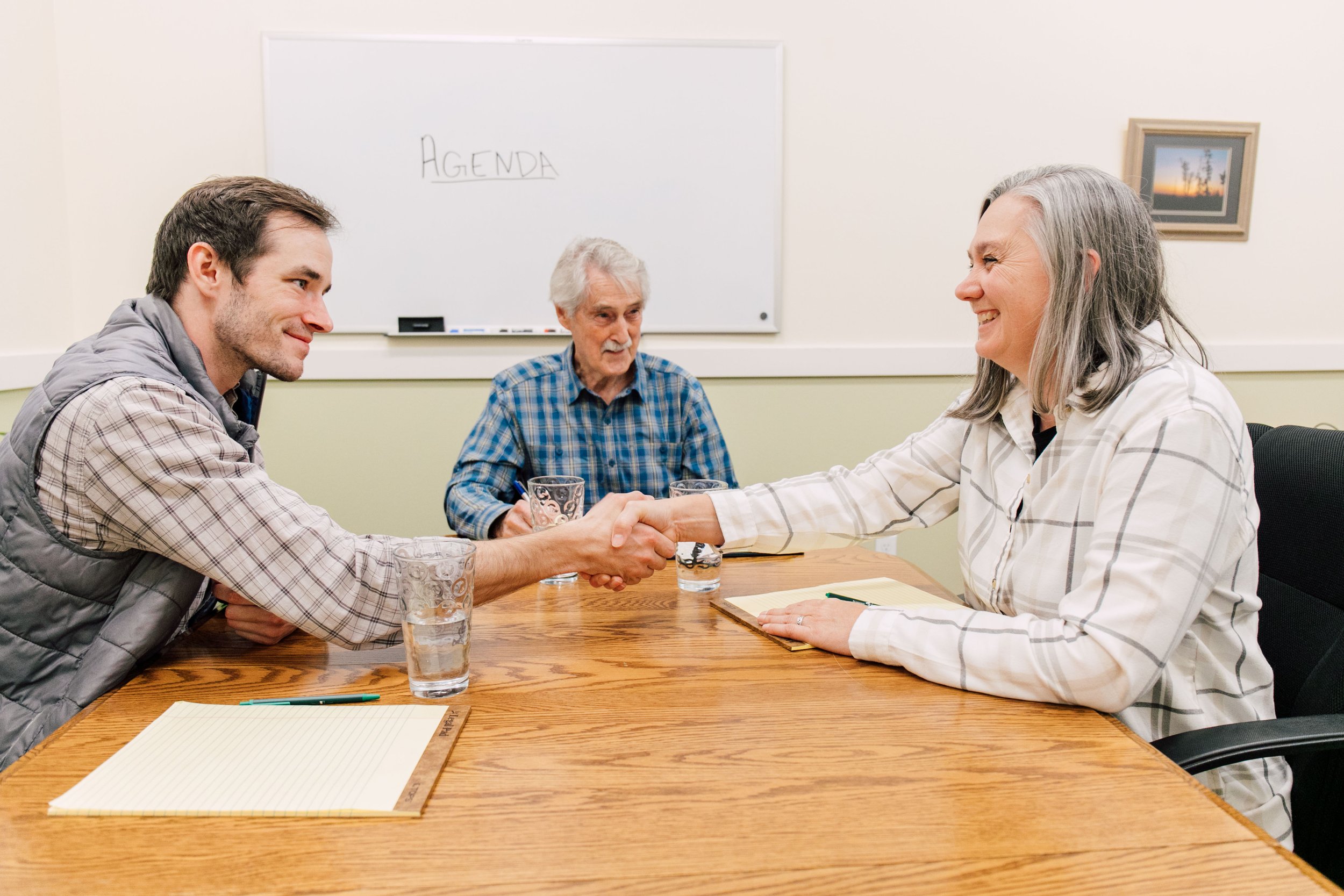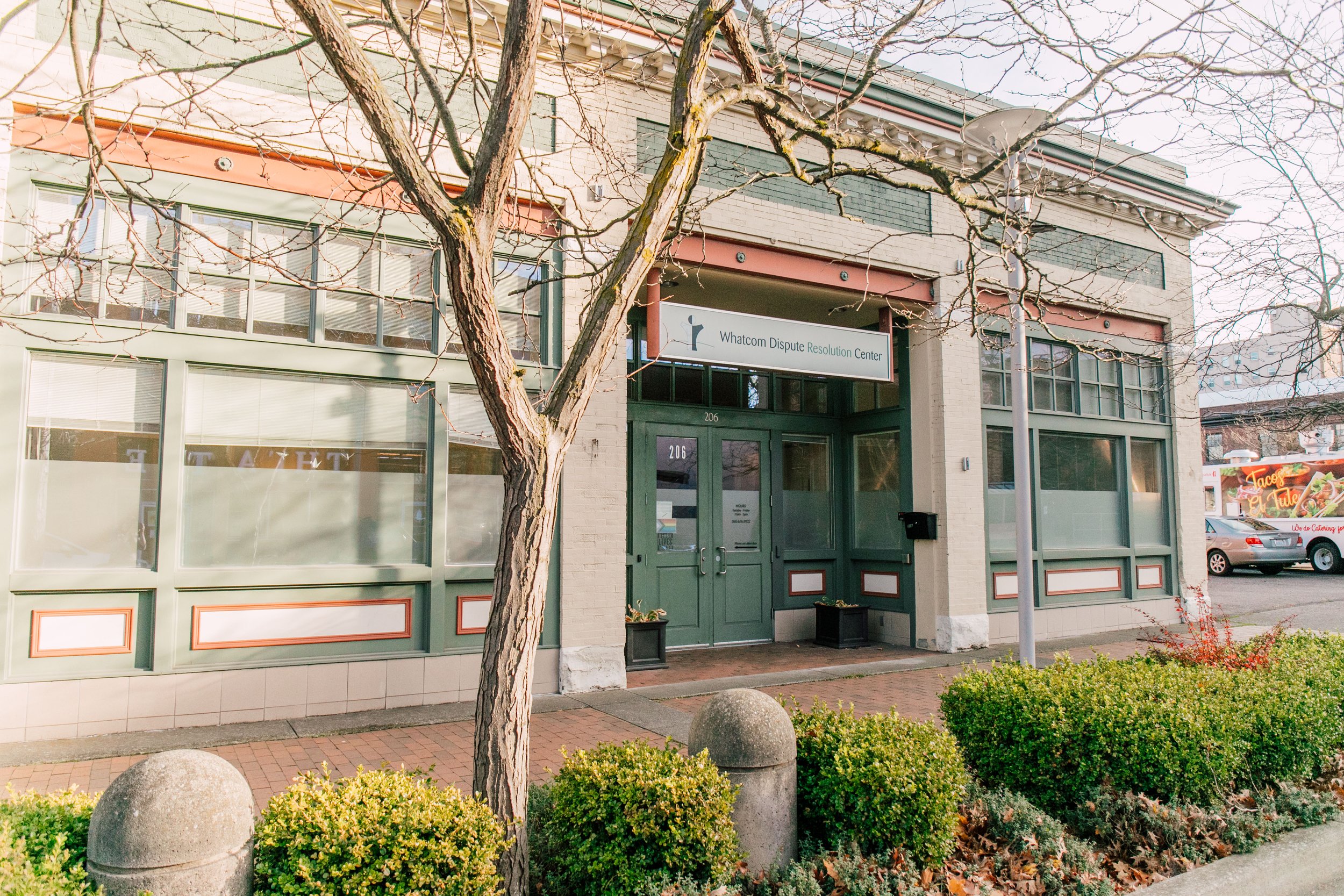What does Mediation have to do with Stable Housing?
Welcome to the WDRC’s Housing Stability Digest, where we explore housing topics relevant to renters, landlords, and all community members from the lens of conflict intervention and prevention. Here you will find tips for navigating and resolving housing-related issues, and stay informed on what resources and opportunities are available to the Whatcom County community.
This inaugural post is an introduction to our Housing Stability program, and how mediation might be helpful to you as a renter, landlord, neighbor, or other housing professional or advocate.
Included in this article:
The magic of mediation - why mediate?
Shaking hands at the mediation table
There are many approaches to addressing conflict. How people reach resolution can vary widely in financial cost, time, and strain on the relationship. Sometimes a simple conversation will do, and other times help is needed. For many housing-related conflicts, a common escalation is filing a case in court, such as in these types of scenarios:
Your tenant has stopped paying rent
Your landlord didn’t give your deposit back
A neighbor’s dog destroyed your expensive landscaping job
Etc…
Mediation is an alternative dispute resolution process with a high success rate. Like in litigation (court), mediation provides a structured decision-making process with a neutral third party, but unlike in litigation, mediation empowers both parties to participate in crafting a mutually-agreeable outcome. Mediation is also far less costly - in fact, for conflicts related to housing, our program offers mediation services at no cost! Another important distinction is that in court, one party wins and the other loses. Sometimes even the person who won feels dissatisfied with the court ruling, as the decision may not fully compensate for their time and expenses. Through the mediation process, parties can collaborate towards the goal of meeting all of their needs, which may not always look the way they had imagined before attempting mediation.
But what if they won't collaborate?
Often when clients approach us, they aren't hopeful that the other party will agree to mediate - perhaps because of how communication has gone recently, or because they don't believe the other party has interest in working together. The decision to negotiate can also be affected by power dynamics and roles. For example, landlords and tenants must each follow certain rules. Property managers may need to report back to or seek approval from their supervisors, and housemates sharing a lease may need to discuss with each other before making a choice that affects everyone. Typically, though, all parties have more to gain from working together than it appears on the surface, and the WDRC explores these possibilities as part of the intake process.
Let's take a look at some of the motivations landlords and tenants may have to mediate:
Landlords
Costly to see an eviction case through, and not a given that they will recuperate rent.
Chance to set up a repayment plan the renter can follow through on.
Can be easier to retain ongoing tenancy than start a new one.
Tenants
Ability to propose solutions that work with their circumstances (e.g. A payment arrangement that lines up with a tenant’s income schedule may help them pay rent on time.)
Resolving issues through mediation, even if it is making a plan for moving out, can help to avoid an eviction filing on their record.
Receiving a good reference for future housing opportunities.
Benefits to everyone
Opportunity to be heard and understood by the other party, face-to-face.
Ongoing conflict and tension is taxing on everybody's energy.
Gaining clarity on what is possible for each party – and what their needs and priorities are – can help create lasting solutions that address underlying interests.
Preserving relationships through a more amicable, less adversarial approach.
Folks come to the mediation table with all sorts of issues including unpaid rent, neighbor disputes, lease violations, crossed boundaries, property damage, maintenance issues … and so much more. And most often they leave with a better understanding of one another, a plan for moving forward, and an improved relationship.
What happens when you contact our program?
Entrance to the Whatcom Dispute Resolution Center building in downtown Bellingham
When you call our office to request mediation, one of our case managers will connect with you for a confidential intake call. They are kind, compassionate people, and their job is to work with you to determine whether mediation is a good fit for your concerns. You provide information for the party/ies with whom you are seeking resolution, and the case manager will then reach out to them to ask if they are willing to try mediation. If both parties are willing, you will schedule a two-hour virtual or in-person meeting.
Housing Success Story
Rose had been leasing a studio apartment to Joey for six years, and Joey was now three months behind on rent. As a small business landlord, it was a stretch for Rose to pay the bills for the property without Joey’s rent payments. Rose and her spouse were having disagreements about the tenancy. They had posted a pay or vacate notice on Joey’s door. While the tenancy had been historically positive, Rose felt like it needed to end. However, she didn’t want to harm Joey and be responsible for causing someone to become homeless. She also really did not want to go to court for an eviction and incur court costs. She didn’t know what to do.
Joey quickly agreed to mediation. They took the pay-or-vacate notice seriously, and were ready to do anything to find a way to stay in their studio. It was the one place they felt truly safe.
During the mediation, Joey shared that they had been in a period of mental health instability. They needed this home to be able to put the pieces back together, and rebuild stability in other parts of their life, including paying rent. They didn’t have the resources to move to a new apartment or a temporary place to go. None of their friends had the resources to support them, and their family stopped speaking to them after they came out as transgender. They were truly on their own. Joey knew that they would become houseless if they didn’t find a way to stay.
Rose was sympathetic to Joey’s situation, but she needed to know that Joey would repay the rent and make future rent payments on time. With the mediator posing questions about ways to move forward, the clients came up with a plan that met Joey’s need for housing stability, and Rose’s need for payment and trust.
They updated Joey’s lease to month to month. They agreed that Joey could stay for as long as they could pay and would voluntarily move out if they couldn’t. With the security of home, Joey expressed confidence that they would find a new job within two months and be able to offer a repayment plan soon. This was enough for Rose, who was relieved that if Joey didn’t pay once, she wouldn’t have to go through the eviction process and she wouldn’t have to pay court fees.
When we heard from Rose two months later, we learned that Joey had paid both months on time so far and had started a new career. Rose was feeling positive that Joey would soon be able to repay the three months they still owed. Because of incredible community support, we were able to offer these clients services at no cost, and today, Rose is receiving rent on time and Joey has a home.
People experiencing housing instability in our community are often navigating coinciding risk factors related to mental health, loss, and belonging. Mediation provides a space where community members can share their current circumstances — generating empathy, compassion and accountability with each other, and leading to durable resolutions.
Requesting mediation services
Please reach out to us if you have any questions or would like to schedule a mediation. Our program can be reached at housing@whatcomdrc.org or 360-676-0122 ext. 115. You may also fill out our online intake form to request mediation, and one of our case managers will get in touch with you.


